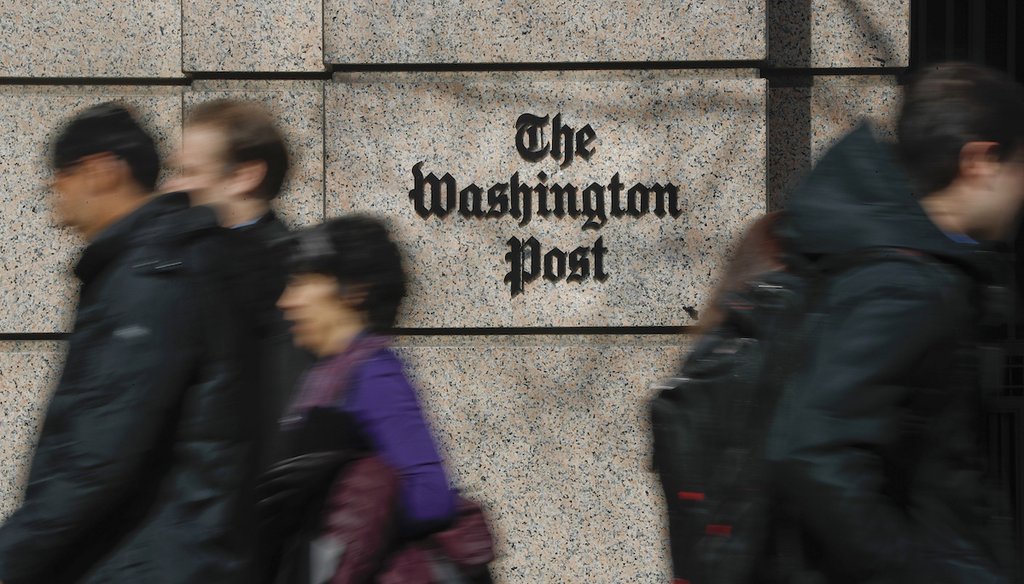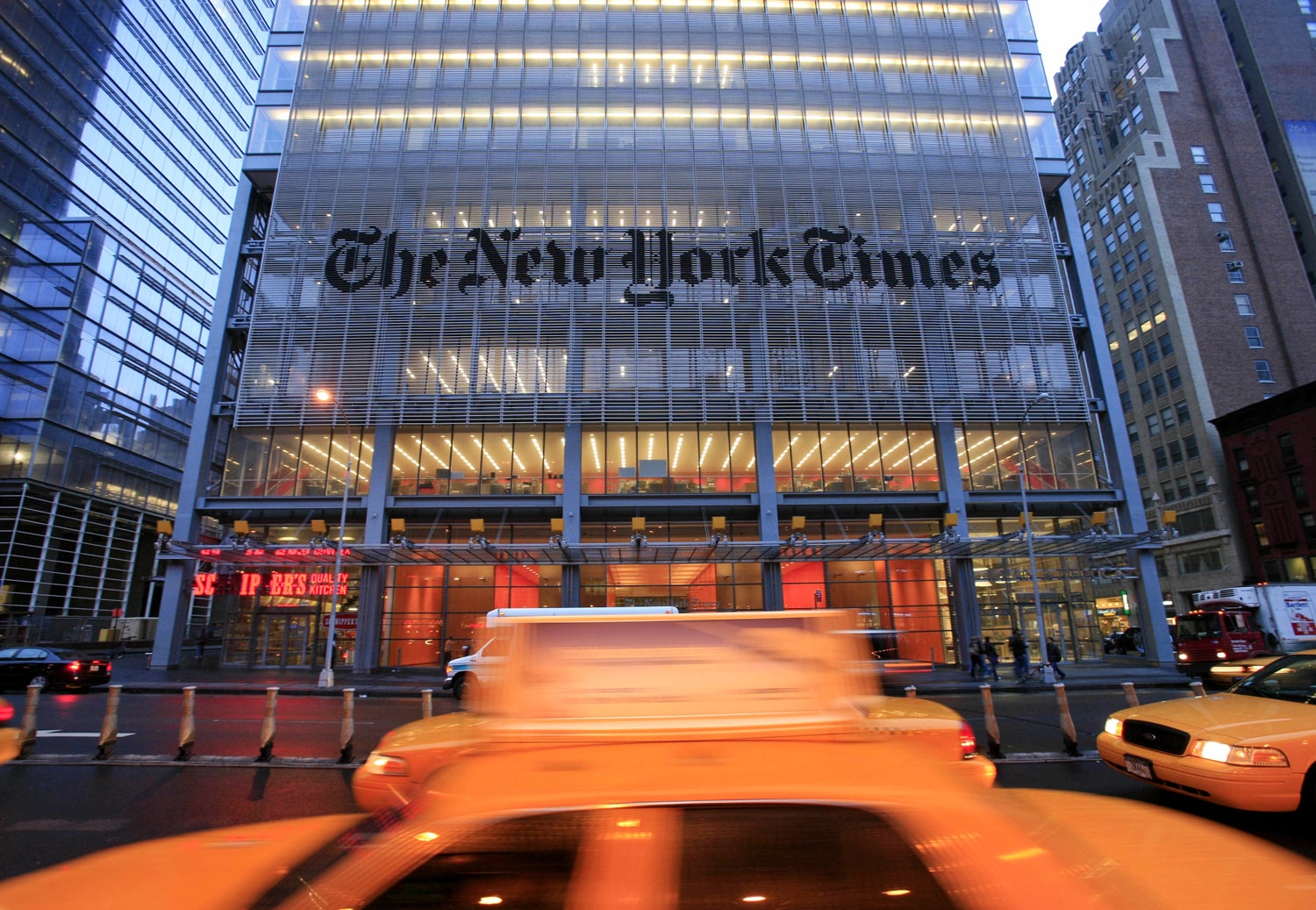Get PolitiFact in your inbox.

In this 2019 file photo, people walk by the One Franklin Square Building, home of The Washington Post newspaper, in downtown Washington. (AP Photo/Pablo Martinez Monsivais)
A graphic shared on Twitter shows a significant increase in use of the words "racist, racists or racism" in articles published in four major U.S. newspapers.
From 2010 to 2020, it says, the frequency of those words increased 712% in The New York Times; 756% in the Los Angeles Times; 361% in The Washington Post; and 468% in The Wall Street Journal.
Some social media users are pointing to the graphic as evidence that those publications and legacy media are promoting an agenda by writing more frequently about racism.
"It’s not an accident — they never miss a chance to push for racial division & riots," Twitter user Rogan O’Handley, who uses the handle DC_Draino, tweeted. He has more than 789,000 followers.
"Bigotry porn," another Twitter user said of media coverage. Twitter owner Elon Musk wrote "massive public manipulation" when quoting and sharing that tweet with his 139 million followers.
But the study from which the graphic derived doesn’t draw that conclusion. The information in the graphic was part of broader research that looked widely at news media and found that terms denoting prejudice were increasing in all news media, not just the four outlets named in the chart.
And the study’s lead researcher in February said that the use of those terms decreased in those same publications in 2021 and 2022, years following the study period.
The graphic was first shared in a May 8 Twitter thread by David Rozado, a research scientist and associate professor at Te Pūkenga — the New Zealand Institute of Skills and Technology. Other charts in the thread showed increases in the use of words such as "homophobia," "islamophobia" and "anti-semitism" in the same news outlets.
The research stemmed from "Prevalence of Prejudice-Denoting Words in News Media Discourse," a 2021 study Rozado co-authored with two colleagues. Rozado summarized the study July 19, 2021, on Substack.
When contacted by PolitiFact, Rozado answered questions about the study data but did not respond to follow-up questions about how other people are representing the data.
What the study showed
The researchers said their study "track(ed) the prevalence of words that describe prejudice" in the 47 most popular news media outlets, covering 27 million news and opinion articles between 1970 and 2019. The diverse group of outlets included The Associated Press, Fox News, The Huffington Post and Newsmax.
The study did not include data from 2020, when racial tensions escalated across the U.S. following the May murder of George Floyd by a Minneapolis officer. But the May 8 tweet by Rozado includes the 2020 data, along with data about the Los Angeles Times’ use of the words that wasn’t in the study. The graphic circulating on Twitter includes those data points too.
The study found a "sharp, substantial, and ubiquitous" use of terms including "racist, racists or racism," "sexism" and "transphobia," in the media from 2010 to 2019. Words denoting racism were used at a higher frequency than the other terms, it said. The researchers acknowledged that the study was limited because it did not show the context in which the words were used.
Rozado said in a Feb. 15 tweet that use of those terms decreased in the same publications in 2021 and 2022. He plans to publish an update to the 2021 study.
The study said the increasing use of "prejudice-related words" in news articles was seen across all 47 outlets analyzed, "regardless of their ideological leanings," which it measured based on the AllSides media bias ratings.
Poynter, PolitiFact’s parent, has reported that ratings like those from AllSides can be a useful media literacy tool. AllSides "focuses solely on political bias," according to Poynter. The tool is not a measure of accuracy. "Reliability is critical, too," Poynter wrote, "and the accuracy and editorial standards of organizations play an important role in sharing informative, useful news."
Why were those words used more often?
The researchers didn’t identify a cause for the words’ increased use in the media, but called for future studies on potential causes and the impact of news media "rhetoric."
They said the increased use of these terms came alongside long-term decreases in "overt expression of prejudice" but also alongside recent increases in "the perceived prevalence of such prejudice among the general public."
While the study offered no conclusive cause for the increase, there were several major race-related news events from 2010 to 2019 that could have stoked the rise.
The chart shared on Twitter shows frequency of the words spiked around 2008, when Barack Obama became America’s first Black president. It shows other increases around:
-
The 2014 police killings of four Black people: Michael Brown in Ferguson, Missouri; Eric Garner in New York; Laquan McDonald in Chicago; and 12-year-old Tamir Rice in Cleveland;
-
An August 2017 white nationalist rally in Charlottesville, Virginia — and then-President Donald Trump’s reaction to it;
-
The 2020, police killings of two Black people: Breonna Taylor in Louisville, Kentucky; and Floyd in Minneapolis.
David Rothschild, a Microsoft Research economist who has studied the media, said the study's authors did a "careful job in laying out what the paper shows and does not show."
"Everything publications cover is by definition a choice," Rothschild said. In past eras, he said, publications may have "chosen to perpetuate prejudice ... or ignore it."
At least three newspapers — The Philadelphia Inquirer, The Kansas City Star and The Baltimore Sun — in recent years have published stories apologizing for past coverage of Black communities.
"Publications are now choosing to cover prejudice more in a time where people are increasingly attuned to it, when politicians are increasingly using it as part of their rhetoric, and it is overtly driving key political and social events," said Rothschild.
He said it shows no more media "manipulation" than many of the same publications choosing to cover Musk.
Our Sources
Elon Musk, tweet, May 9, 2023
Tweet, May 9, 2023
Tweet, May 9, 2023
David Rozado, twitter thread, May 8, 2023
David Rozado, tweet, Feb. 15, 2023
David Rozado, email interview, May 11, 2023
David Rozado, "Prevalence of Prejudice-Denoting Words in News Media Discourse," July 19, 2021
David Rothschild, Microsoft Research, email interview, May 14, 2023
Sage Journals, "Prevalence of Prejudice-Denoting Words in News Media Discourse: A Chronological Analysis," July 27, 2021
Zenodo, "Data for manuscript: ‘Prevalence of prejudice denoting words in news media discourse: a chronological analysis’," accessed May 12, 2023
Zenodo, "Dataset for Report: ‘The Increasing Prominence of Prejudice and Social Justice Rhetoric in UK News Media’," accessed May 12, 2023
Otago Polytechnic, "David Rozado reports on recent language usage trends in US news media," October 2021
The Baltimore Sun, "We are deeply and profoundly sorry: For decades, The Baltimore Sun promoted policies that oppressed Black Marylanders; we are working to make amends," Feb 18, 2022
The Philadelphia Inquirer, "Black city. White Paper." Feb. 15, 2022
The Philadelphia Inquirer, "From the publisher of The Inquirer: An apology to Black Philadelphians and journalists," Feb. 16, 2022
The New York Times, "Kansas City Star Apologizes for Racism in Decades of Reporting," Dec. 21, 2020
AllSides, "AllSides Media Bias Chart," accessed May 12, 2023
Poynter, "Should you trust media bias charts?," Nov. 2, 2021


























